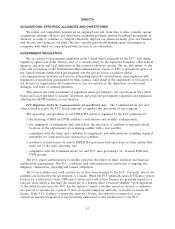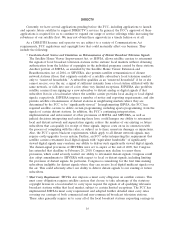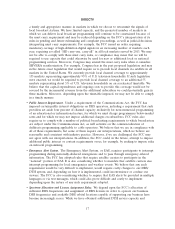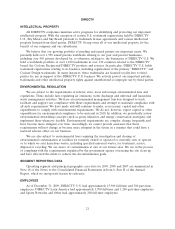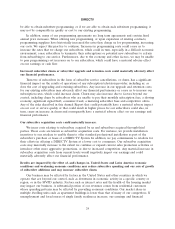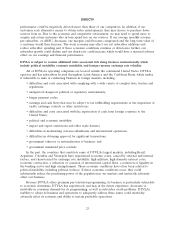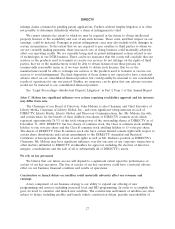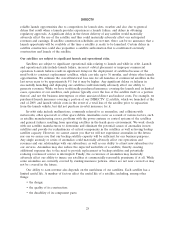DIRECTV 2009 Annual Report Download - page 32
Download and view the complete annual report
Please find page 32 of the 2009 DIRECTV annual report below. You can navigate through the pages in the report by either clicking on the pages listed below, or by using the keyword search tool below to find specific information within the annual report.DIRECTV
Moreover, in the transaction between News Corporation and Liberty, the Commission required
us to sever all ‘‘attributable’’ links between DTVLA’s subsidiary, DIRECTV Puerto Rico Ltd.
(‘‘DTVPR’’), and a Puerto Rico cable operator owned by an affiliate of Liberty. In order to
comply with this condition, we put our entire interest in DTVPR into a divestiture trust in
February 2009. However, we cannot be sure that the FCC will agree with our view that the trust
is sufficient to sever all attributable links between the two companies, or that it will not require
us to undertake further cumbersome and expensive measures to eliminate such attribution.
International Telecommunications Union Rules. We are required by international rules to coordinate
the use of the frequencies on our satellites with other satellite operators who may interfere with us or
who may suffer interference from our operations.
Other Legal and Regulatory Requirements. DBS/DTH providers are subject to other federal and
state regulatory requirements, such as Federal Trade Commission, FCC and state telemarketing and
advertising rules, and subscriber privacy rules similar to those governing other MVPDs. We have agreed
with the Federal Trade Commission to (1) review and monitor compliance with telemarketing laws by
any companies we authorize to do telemarketing as well as by independent retailers, (2) investigate and
respond to complaints about alleged improper telemarketing and (3) terminate our relationship with
marketers or retailers found in violation. Similarly, we have agreed with certain state attorneys general
to comply with advertising disclosure requirements and monitor compliance by independent retailers.
In addition, although Congress has granted the FCC exclusive jurisdiction over the provision of
DTH satellite services, aspects of DBS/DTH service remain regulated at the state and local level. For
example, the FCC has promulgated rules prohibiting restrictions by local government agencies, such as
zoning commissions and private organizations, such as homeowners associations, on the placement of
DBS receiving antennas. Local governments and homeowners associations, however, may continue to
regulate the placement of such antennas if necessary to accomplish a clearly defined public safety
objective or to preserve a recognized historic district, and may also apply to the FCC for a waiver of
FCC rules if there are other local concerns of a special or unusual nature. In addition, a number of
state and local governments have attempted to impose consumer protection, customer service and other
types of regulation on DBS operators. Also, while Congress has prohibited local taxation of the
provision of DBS service, taxation at the state level is permissible, and many states have imposed such
taxes, and additional states have attempted to do so recently. Incident to conducting a consumer
directed business, we occasionally receive inquiries or complaints from authorities such as state
attorneys general and state consumer protection offices. These matters are generally resolved in the
ordinary course of business.
In Latin America, DTVLA and its subsidiaries are subject to laws and regulations in each country
in which they operate that govern many of the same aspects of our operations as in the United States,
such as landing rights for satellites; spectrum, earth station and other licenses; must carry and other
requirements with respect to the channels we carry; and regulations governing telemarketing and
customer service, etc. Regulatory regimes in Latin America are generally less developed than in the
United States, and the application of existing laws and regulations to DBS providers is at times
uncertain. In addition, there are certain areas where regulations in Latin America are stricter than in
the United States, such as regarding labor and consumer protection laws. Foreign exchange laws in
some countries can have a material impact on our ability to repatriate funds to the United States. Also,
recently in several countries such as Brazil there have been proposed laws that would require us to
carry certain thresholds of domestic or ‘‘national’’ content which, if approved, could have a material
impact on our subsidiaries operating in those countries.
20







